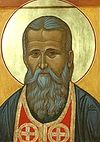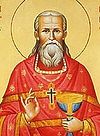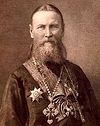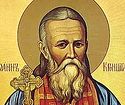

| Previous day | Next day |
| Old Style
October 19
|
Thursday |
New Style
November 1
|
| 23rd Week after Pentecost. Tone 5. | No fast.
|
Righteous John, Wonderworker of Kronstadt (1908). ![]() Prophet Joel (800 b.c.).
Prophet Joel (800 b.c.). ![]() Martyrs Warus and seven others with him, in Egypt (ca. 307).
Martyrs Warus and seven others with him, in Egypt (ca. 307). ![]() First translation of the relics of St. John, founder of Rila Monastery in Bulgaria (1187).
First translation of the relics of St. John, founder of Rila Monastery in Bulgaria (1187).
Blessed Cleopatra (327) and her son John (320), in Egypt. Hieromartyr Sadoc (Sadoth), bishop of Persia, and 128 martyrs with him (342). St. Anthony (Abashidze), schema-archbishop, of the Kiev Caves Lavra (1942).
New Hieromartyr Alexis Stavrovsky, priest, of Petrograd (1918).
St. Leontius the Philosopher, of St. Sabbas Monastery (624). St. Frideswide of Oxford, abbess (ca. 735). St. Prochorus, abbot, in the Vranski Desert on the river Pchinja in Bulgaria (10th c.). New Monk-martyr Nicholas Dvali of Jerusalem (1314). St. Gabriel, archimandrite, of St. Elias Skete, Mt. Athos (1901).
Thoughts for Each Day of the Year
According to the Daily Church Readings from the Word of God
By St. Theophan the Recluse

Thursday. [Col. 4:2-9; Luke 9:49-56]
How should one relate to unbelievers who do not confess the Lord? The same way as the Lord related to the village that did not receive Him. Youthful zeal, full of heat, would want to send down fire from heaven on them; but the Lord Himself restrains it: Ye know not what manner of spirit ye are of… The Lord and Saviour did not do anything to those who did not receive Him, though receiving Him is what salvation itself consists of; but passing them by, He went to another village, leaving them to themselves. The same applies now: let unbelievers go their way, and believers go theirs. God exists, Who will sort everyone out in good time. It is necessary to pity and pray for them; one must desire that they know the truth and try to find opportunities to hint to them about it; but when they openly start attacking the truth, give them a rebuff which is loving and yet brings them to their senses—and that is enough.













